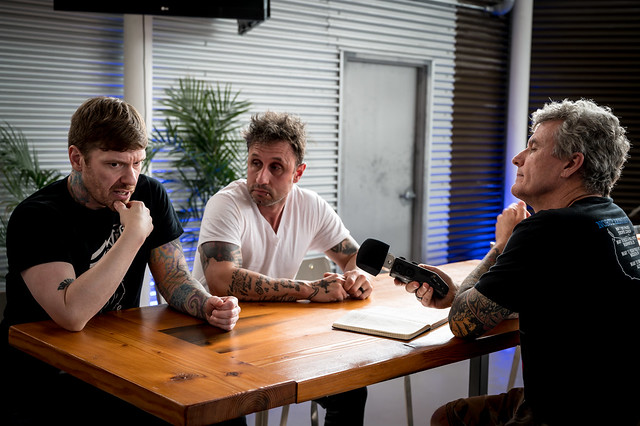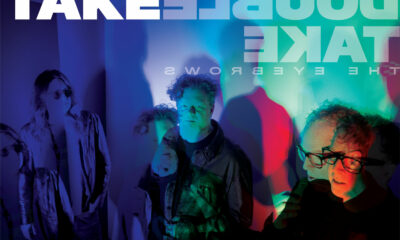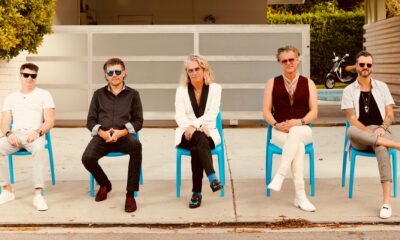Interviews
SHINEDOWN’s BRENT SMITH and ERIC BASS Discuss ‘Attention Attention,’ Understanding Radio, and Director KEVIN SMITH [w/ Audio]
Supporting their sixth album Attention Attention (Atlantic Records), Mike Bax spoke with Shinedown’s Brent Smith and Eric Bass about making the record, pressure to create radio-friendly singles, and director Kevin Smith.
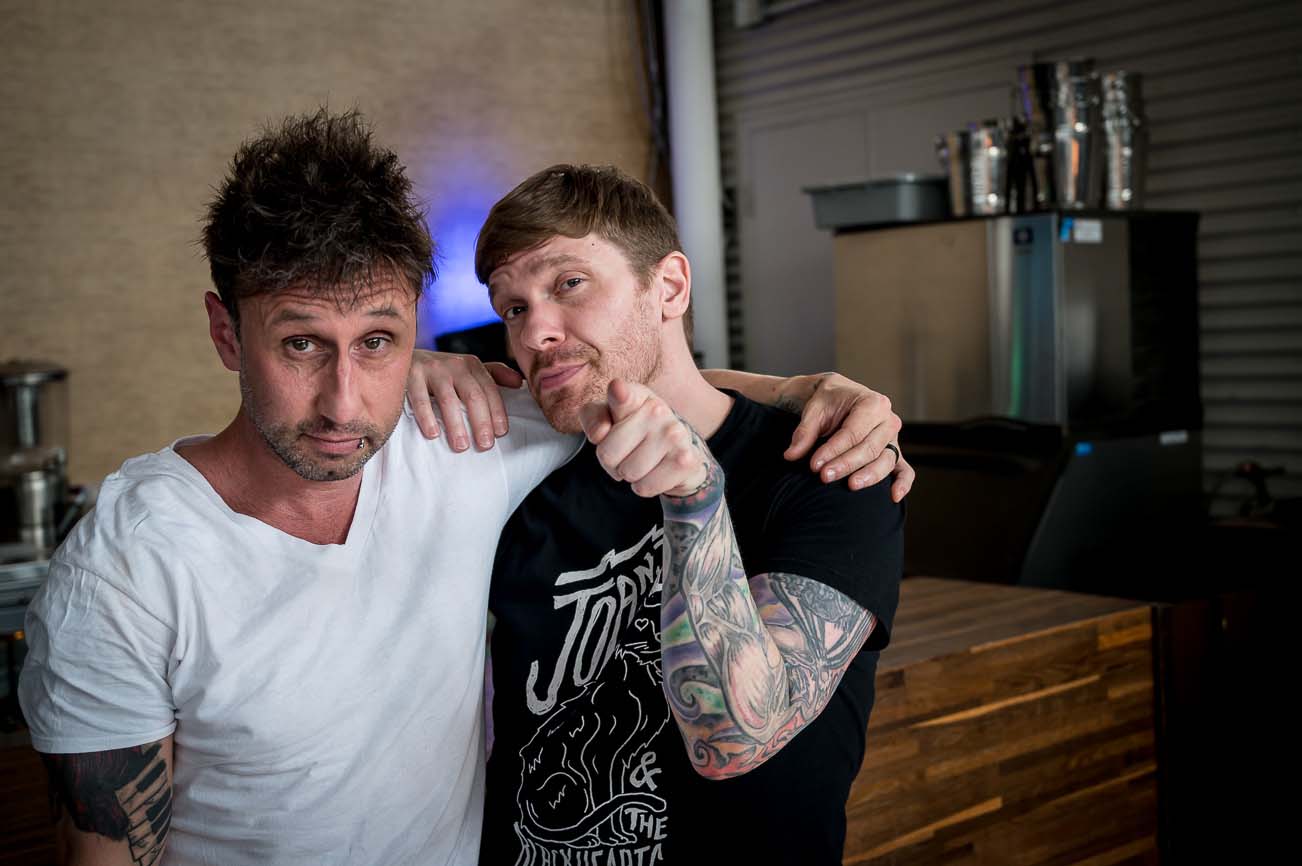
A couple of weeks back, Shinedown brought their incredible live tour through Toronto to perform at the RBC Echo Beach stage, joined by Badfinger, Dinosaur Pile-Up and Broken Hands as their support. Brent Smith, Barry Kerch, Zach Myers, and Eric Bass were doing a video interview in a seated area behind the Amex Lounge at Budweiser Stage before breaking up into pairs, when Brent Smith and Eric Bass walked over to me and introduced themselves.
Full disclosure here; I am not very familiar with Shinedown’s material. I have heard the majority of their radio singles, of course, but I hadn’t committed to properly listening to their material until I knew I’d be interviewing them and then opted for some due diligence and played their catalogue of arena-ready rock. I found the majority of their most recent album, 2018’s Attention Attention, to be very strong in both songcraft and production and I arrived at the venue excited to get the chance to chat with the band.
Of the two pages worth of questions I had prepared, I only got through two questions as Smith and Bass parlayed the details of how they created and recorded Attention Attention. They were both articulate and concise in their answers, and I left this interview feeling like Shinedown are a very focused group, comprised of four genuinely decent human beings who also genuinely enjoy what they do. The SoundCloud audio of our conversation is embedded here for anyone interested in listening to Brent and Eric’s answers in real-time. For more Shinedown, and a full list of the band’s extensive touring schedule that will last all the way through the rest of the year, visit their official website.
“Monsters” is the third, and latest, single off Attention Attention. Check out the powerful new music video:
If what I’m recording online is accurate, a lot of this album you put out last year, Attention Attention, was written by Eric. He jammed out a bunch of riffs, and you guys put it together and formed a concept album out of it? Is that accurate?
Brent Smith: So, in 2016 we were finishing up a co-headlining tour with a band called Five Finger Death Punch (who we are quite close with). And he (motions to Eric) did not want to, every single day look at a clock just ticking away. He had to figure out a way to keep himself occupied so what he decided to do is he brought his Pro Tools rig out, and every day he would go into the arena, and he would find a room, and he would write a song. He would write a composition. It could be, you know, 30-minutes-long, or it could be seven-minutes-long.
He ended up with about 22 compositions by the end of that tour and then, so, the following year we we took a minute just to kind of decompress from the touring cycle and then we played a show in Michigan and then I remember the night before the show was like the first time that I started to listen to what he had. And as that happened, we started making arrangements for me to arrive in Charleston, South Carolina because that’s where his studio is and we started going through everything. We didn’t have a plan. We just started.
Eric Bass: And those songs, they weren’t even songs, they were tracks and some melodies, and that’s basically what I would do, you know? Because the seed of the lyrical idea always has to come from Brent. So I never really paint any lyrics into anything. But definitely melodic ideas are there for some of the things. But those things ended up just becoming a safety net, which was great because we started writing from scratch at that point. So when we convened in Charleston, we didn’t even get into any of that stuff. And then we just started writing from scratch, and we wrote “Black Soul” and “Monsters” for the first two things we wrote for the record.
“Black Soul” was a little different in the demo form. I think it was it had a completely different verse. A completely different vibe to it. But we always thought the chorus was really good and the guitar solo section was really good. And we wanted to keep those things. So we had to retool it when we did the record, but “Monsters” was pretty much in the form that you hear it on the record.
Shinedown’s sixth studio album, Attention, Attention, was released on May 4th, 2018, via Atlantic Records:

Smith: The other thing that we did was… we’re normally a band that will just do this: it’s two machines. One is the live aspect of what we do, performance, and then the other is the studio. What we did differently on this album was, well, we got an opportunity of a lifetime to do 44 dates with Iron Maiden in 2017. So we had already been in the studio for a minute. We had done “Black Soul” and done “Monsters,” and we’re working on a couple of other ideas and this and that, but then we had to bolt and go do this big tour. We came back, and it actually gave us a lot of perspective. We ended up writing “Brilliant” at that point. That was inspired by the European audience and the UK and things of that nature.
But we had a couple other times of that year where like in July we went out and did some festivals in the U.S. because normally, we would be in the studio for an entire year. It was really beneficial because it allowed us to kind of get out of the studio for a minute just to get a different perspective so when we came back, we had a little bit more of a clear head at times. But the other interesting thing too was because we had had such great teachers on the other albums, and Eric had been doing certain songs, we’d written a lot of songs together, but we’d worked them through other producers and engineers. But he (Eric) produced, and it’s his engineering and his work on “Cut the Cord” and on “Diamond Eyes.” Also, “Her Name Is Alice,” which was from Through the Looking Glass. And then the amount of songs that he and I have written together, and with the rest of the band, it’s a pretty heavy catalogue. But it was time for him to take the captain’s chair for the entire project.
Our A&R person actually says (and I don’t really notice it like this), once again, you get great teachers. I did kind of A&R the record because he (Eric) was the only person that I saw that could do the record to make it sound, and to make it be what it was. The other people that we worked with in the past (and even newer people) I felt like they were not going to get it. And not only did he produce it but he mixed it. He was the main engineer. I spent 179 days with him. And the only reason I know that is because I stayed at a Hyatt Hotel the entire time. So when I finally left, actually the day that I left for the final time, they had like all these balloons and stuff downstairs in the lobby because they knew what time I was leaving. But, you know I looked at it and said, “I don’t say goodbyes, I’ll see you next time.”
Shinedown’s Brent Smith and Eric Bass backstage at RBC Echo Beach (Toronto, ON) on July 9, 2019:
Bass: Yeah, for me, I think that when I thought about it, I never really had any second thoughts about producing the record. Mixing the record was another thing. I maybe wasn’t the biggest fan of taking that on at first. But as far as producing the record goes I think that I didn’t want to be frustrated sitting in a room with someone else producing this. And in the back of my mind, you know, going “you’re doing it wrong, you’re doing it wrong.”
Smith: You had a good way of saying that though.
Bass: Yeah. That I’d rather go crazy making this record, go crazy myself making this record, then go crazy watching someone else try to make it.
And how frustrated did you actually get?
Bass: Never, actually, man. Because it’s the most amazing thing. I don’t know what it was. I had this “knowing” about this record before we even started. I mean I’d been there from the birth of most of these songs. Not all of them, but most of them. I had lived with the demos from the ones that I didn’t write that I knew that we wanted to do and we wanted to work on. And I just I knew what the record wanted to be and what the vibe was. I knew how they wanted to work together and what they wanted to sound like. So just from that seed and knowing that thing, it was very comfortable for me.
Now, were there songs that wouldn’t go quietly? Yeah, there were. There were moments of wrenching things and working things where that didn’t work, and then try it again and try it again. Some of these things on the fourth or fifth try before you get something right. And, even though we had written the song “The Human Radio” that B-section that has the anthem in it didn’t come about until (it was actually) Thanksgiving weekend. You were gone. Everyone was gone but me and Hoogie. Hoogie’s my guitar tech. He’s from Canada.
Smith: I ran up to Tennessee, and we had Thanksgiving then came I back.
Also from Attention, Attention, here’s another radio smash hit with the music video for “The Human Radio:”
Bass: Hoogie stayed for Thanksgiving. He had American Thanksgiving with us, me, and my wife. And I worked every day. I worked Thanksgiving Day; I worked Christmas Day. I didn’t take any days off. So Thanksgiving Day we’re in there, and I tried this different thing. We knew that the seed of “Human Radio” was a great song but that second section just wasn’t happening. It felt boring to me. So we had to rewrite that part in the studio. And I’d been going to the guitar trying to figure it out. I think we tried three or four different things. And then finally I showed Hoogie how to run Pro Tools; this is how you record; This is how you playlist; This is how you erase; I’m going to go to the piano.
And I just sat down on the piano and started playing, and kind of humming some stuff and that was the second thing I came up with, what you hear. And, you know, in that piano that I play on, that just became the bass for that whole section. That’s an example of something that worked. But here’s the thing, I don’t worry about anybody in our band not even myself when it comes to digging in the dirt. You know, we’re going to go digging until we find it, no matter what it takes. And that’s with everything. That’s with touring, that’s with writing, that’s with producing. That’s everything. We stand on our laurels; we don’t rest on them. So, it was going to happen.
“Special” was another one. “Special” was another one of the songs that the demo was produced completely different than what’s on the record. I had an idea what I wanted it to be, but I think that maybe throughout the recording process I was trying to get a little too cute with it and trying to turn it into maybe something more (I don’t know what to say) new-school or something. I was trying all of these things, and it just wasn’t coming together and when I finally went back to, in my heart and my mind, where I knew the song always wanted to be which was piano and strings and it just has that vibe. As soon as we did that it came to life.
Andrew Hartl’s live photos of Shinedown (plus Badflower, Dinosaur Pile-Up, and Broken Hands) at Toronto’s RBC Echo Beach:
Smith: He never walked in without a plan. Every single day he knew what he was going to walk into and accomplish. And so when he had all four of us. Or when it was all four of us, it was never an instance, because the bulk of it was him and me together more than anyone else. But when the band was in the room, he never came in without a plan, and he always came in with a massive just positive energy. He’s not one of these people that goes into a situation and forces you to do something or belittles you or messes with you about it.
He’s more like; (claps hands) “Let’s fucking do this! It’s gonna be badass, let’s go!” And that that helps a lot, especially when it’s coming from a genuine person because he can’t do anything if it’s not 100 percent authentic. He’s not designed to try to pull one over on you. It’s just not the way he’s put together. So it made it very much that you wanted to make him happy. You wanted to give him what he wanted.
Bass: And see, this is a perfect example of one of the best lessons I ever learned about producing which was from a movie director, Kevin Smith. And he said he never walks onto a set without either knowing exactly what he wants to do or faking it like he knows exactly what’s going to happen that day. There were days I worked in the studio where I was like “I don’t know what to do about this. I don’t know what the right thing is to do.” When you walk in there as the leader of the situation, even with my bandmates. These guys know me better than anybody else. I never wanted to walk in there and shrug and say, “I don’t know. I don’t know what we’re doing today. I don’t know.”
And here’s the thing, if I was stewing on something that I was having thoughts about, maybe I’d go to the gym or do a run while I’m trying to solve a problem we were having and I couldn’t solve it, I wouldn’t work on it that day. I’d just move on to something else. There’s always a big chalkboard like a lot of studios have, and you’d x-off everything you’ve accomplished, there’s tons of stuff to do. Just move on to something else. And I like to save a lot of the serious problem-solving for when I have my own personal time with the songs too because I can get a lot done like that.
“Devil” served as the first single and music video from Attention, Attention:
Can you talk a little bit about what it’s like to be a band that charts singles. Does that put additional pressure on you when you’re creating material to follow through on something that is going to be radio-friendly?
Bass: It never has. I was talking to someone about this, I forget who I was talking about it to. Oh, so I had one of my best friends from middle school and high school out at the show the other night. I hadn’t seen him in fifteen years. He’d never seen me play with the band. And he asked me kind of a similar question, and you know I said, you know, you would think that there would be this pressure and I’ve never ever felt that with this band. I think that, you know (I hate using that knowing word again), but it goes back to having that knowing feeling that you’re always going to get it.
And he (Brent) and I look at each other whether we’re at writing sessions or especially making records and we go, “When it’s done, it’s gonna be amazing.” And that’s it. You know there is no pressure. If you didn’t get today, you’ll get it tomorrow. And if you don’t get it that day, you’ll get it the week after. I think that there are enough things out there trying to stymie you being a creator. You don’t need to stymie yourself by putting pressure on yourself. I mean, are some songs harder to write than others? Yeah. Are there moments of looking at your collection of songs and going, “we need another song” or “we need one more.” But I don’t know; I never get stressed out about it.
Smith: Well, I mean the other side of it too is that you know from a charting position also, in the very very beginning of the band’s inception going all the way back to 2003, we had this idea that it was going to be on the cover of the Rolling Stone and Spin magazine. They’re gonna play all of our music videos on MTV, and it’s gonna be awesome. That didn’t happen. It didn’t happen because a lot of those fundamental outlets were like; “This band sucks. They’re ugly. We don’t get it. We don’t understand it. We don’t like them. They’re gonna be lucky to sell five copies.”
So what we had to do was; we had to look at it from a different perspective. And one of the things that I did was I started to ask questions about radio. I started asking questions about how does radio work? What makes it tick? Why does it work the way that it does? Then I started to (you know and obviously in North America first and now going almost 20 years into it) learn so much more about the evolution of the music industry and things of that nature.
A recent press shot of all four of Shinedown’s members:

But here’s the reality. We did everything that we could for radio. We never said no. We still don’t say no. Now we might have to alter some of the things that we do because we just had our fourteenth number one song in the United States and it’s the 26th single that we have released as a band. And this country specifically, and Toronto specifically, we are really fundamentally trying to give back to Canada and the Canadian population and the fan base here. We’re always trying to figure out a way to come up here on our terms to give the audience in every country ultimately what we do in America.
But going back to the single mentality, we never have written a song because we wanted to be famous. We wrote the songs because we had something to say. And at the end of the day, I like stuff that’s got a hook. Do you know I mean? I like to sing it. I mean, look what I do for a living. I’ve just always been attached to melody. I don’t think it’s one of those things that like we instinctually know. It’s the same thing with an album. I remember when The Sound of Madness came out, we toured that record for 37 months and people were like, before Amaryllis came out, they’re like “how are you going to top The Sound of Madness?” Well, we’re not going to top The Sound of Madness. The Sound of Madness is written. It’s there forever. We don’t make the same record twice, and we don’t write the same song over and over again.
Bass: There’s something really freeing about that when you’re being creative. Attention Attention is an amazing record for us. And it was so much fun to make. It’s like your child, and I love it very much. The last thing I’m going to do is try to make that record again. So going into the next record, it’s what can I mine now that I haven’t mined before. It’s in my head, and it’s in the ether that’s in his head. What can we grab from that we haven’t grabbed from yet?
Smith: It’s, “what do you have to say?” You’ve got a platform that the audience gave us, and we’re very respectful of that because we’ve got one boss; it’s just everybody in the audience. They’ve given us a platform to be ourselves, so the last thing we’re ever going to do is fucking phone it in.
-

 Alternative/Rock7 hours ago
Alternative/Rock7 hours agoThe V13 Fix #010 w/ High on Fire, NOFX, My Dying Bride and more
-

 Hardcore/Punk7 days ago
Hardcore/Punk7 days agoHastings Beat Punks Kid Kapichi Vent Their Frustrations at Leeds Beckett University [Photos]
-

 Alternative/Rock6 days ago
Alternative/Rock6 days agoA Rejuvenated Dream State are ‘Still Dreaming’ as They Bounce Into Manchester YES [Photos]
-

 Culture1 week ago
Culture1 week agoCirque Du Soleil OVO Takes Leeds Fans on a Unique, Unforgettable Journey [Photos]
-

 Music1 day ago
Music1 day agoReclusive Producer Stumbleine Premieres Beat-Driven New Single “Cinderhaze”
-
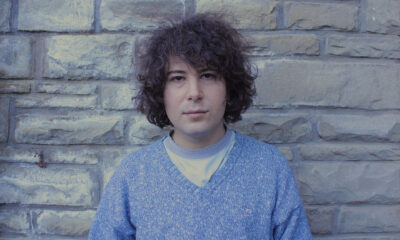
 Indie1 week ago
Indie1 week agoMichele Ducci Premieres Bouncy New Single “You Lay the Path by Walking on it”
-

 Culture2 days ago
Culture2 days agoDan Carter & George Miller Chat Foodinati Live, Heavy Metal Charities and Pre-Gig Meals
-

 Alternative/Rock1 week ago
Alternative/Rock1 week agoWilliam Edward Thompson Premieres His Stripped-Down “Sleep Test” Music Video

